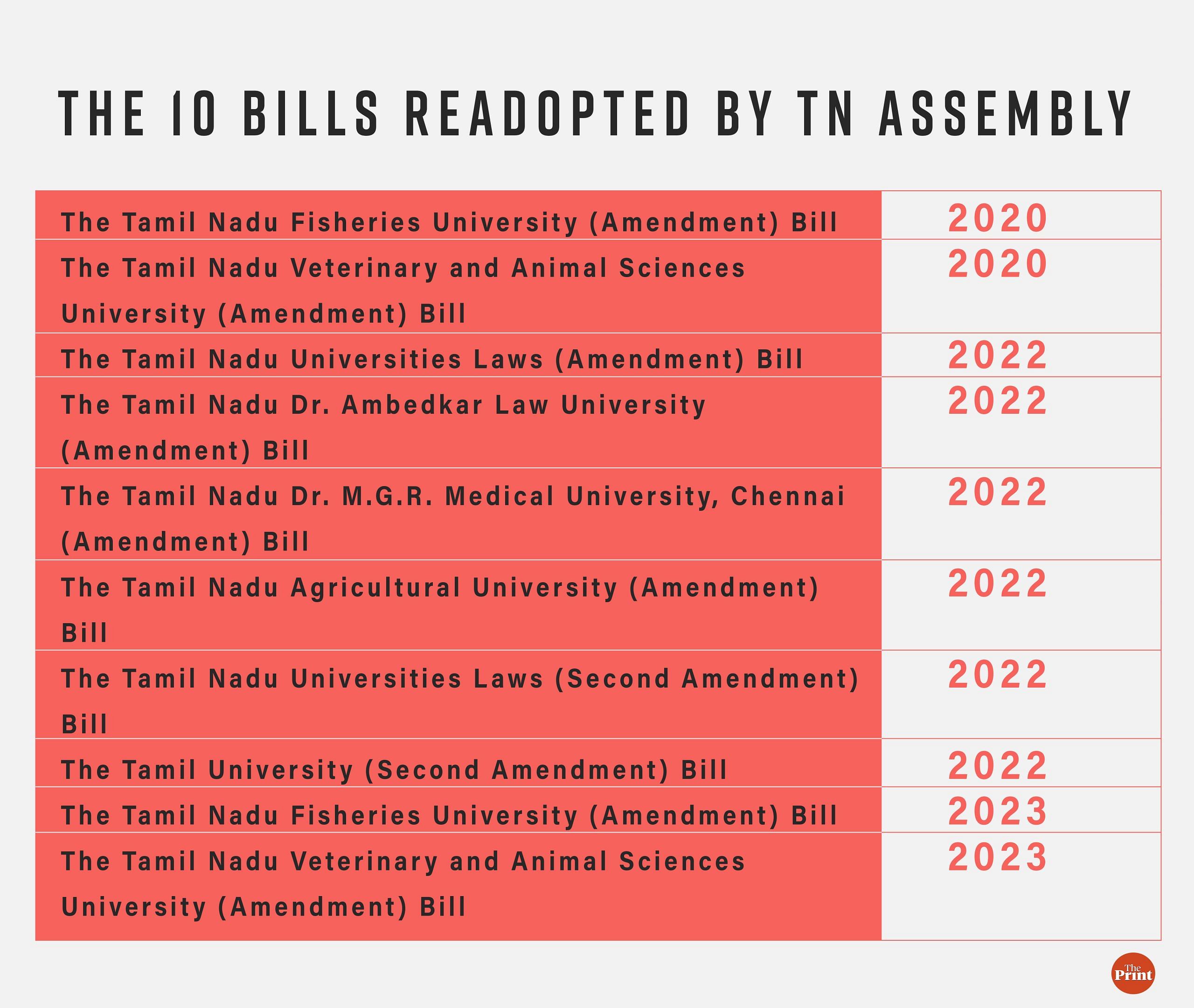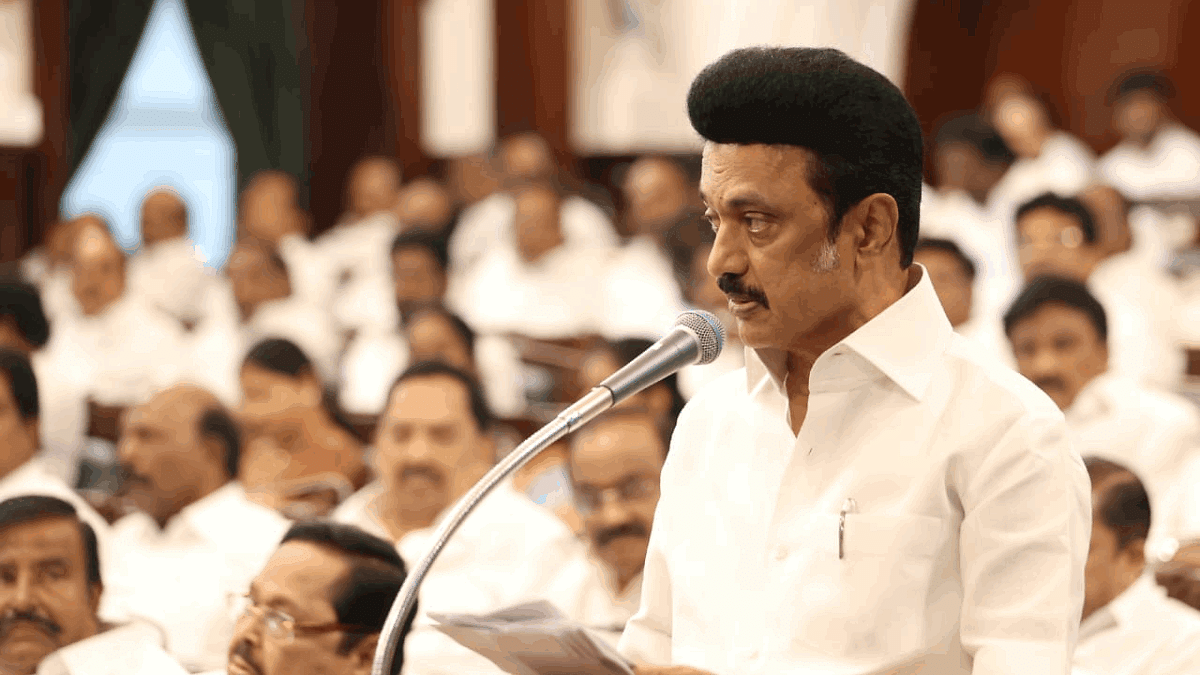Chennai: The Tamil Nadu assembly, in a special session Saturday, readopted 10 bills that Governor R.N. Ravi had returned. Criticising Ravi for withholding his assent and returning the bills without giving any reasons, Tamil Nadu Chief Minister M.K. Stalin called the governor’s move “not acceptable”.
The Tamil Nadu government and the governor have been at loggerheads over several important bills in the past as well, such as the NEET exemption bill, the Tamil Nadu Prohibition of Online Gambling and Regulation of Online Games Bill, and now these, most of which concern several universities in the state.
“Through governors, states are being targeted…being given a hard time,” Stalin said in the assembly, calling Ravi’s delay in giving his assent a move followed in states not ruled by the Bharatiya Janata Party (BJP). He added: “It’s the duty of the governor to grant assent to bills passed by the assembly, which comprises elected representatives of the people. If he has any questions, he can take it up with the government.”
He added: “When the governor has raised queries about certain bills, the state has responded promptly.” Withholding his assent and returning the bills, thus, “is an insult to the people of the state and the elected representatives”.
“This House takes note that under the proviso to Article 200 of the Constitution of India, if the above-mentioned bills are passed again and presented to the Hon. Governor for assent, the Hon. Governor shall not withhold assent therefrom,” the chief minister further said.
On 13 November, Ravi had returned 10 of the 12 bills awaiting his assent. These 10 bills, including two from the previous All India Anna Dravida Munnetra Kazhagam (AIADMK) government, are related to amendments that would dilute the governor’s powers as the chancellor of various universities in the state. For instance, the amended bills give the state the power to appoint the vice-chancellor of a university, and also to inspect and conduct inquiries of the universities instead of the chancellor.

During the discussion regarding the 10 bills Saturday, Leader of the Opposition and AIADMK chief Edappadi K. Palaniswami questioned the validity of reintroducing the bills if the governor had withheld his assent, asking if they were still valid. He also asked if reintroducing the bills would be acceptable as a case regarding them was pending in the Supreme Court.
In response, Law Minister S. Regupathy said that the governor returning the bills to the legislature means he has denied assent, and the state has the right to reintroduce and readopt the bills.
Speaker M. Appavu said that he has the power to convene the House and also hear the bills for reconsideration. “If the governor can return the bills when the court is hearing the case, so also the assembly can reintroduce and re-pass the bills,” Appavu said.
After taking its concerns to President Droupadi Murmu, the state government on 31 October had filed a writ petition in the Supreme Court, seeking intervention in the alleged delay in the governor’s assent to bills passed by the assembly.
Hearing the state government’s petition that the governor was “toying away with the citizen’s mandate”, a three-judge bench headed by Chief Justice of India D.Y. Chandrachud had said on 10 November that the actions of the governor were a matter of “serious concern”.
While the SC has sought the Centre’s response to Tamil Nadu’s allegations, the next date of hearing is 20 November.
On the plea in the apex court, Stalin said during the special session, “The Supreme Court’s remarks on the governor after hearing the arguments placed by the state of Tamil Nadu is our first victory. As the case is being heard, the governor has returned the bills in a hurry.”
Meanwhile, advocate A. Saravanan, spokesperson of the ruling Dravida Munnetra Kazhagam (DMK), said to ThePrint, “After the Chief Justice of India expressed his views (on the alleged delay by the governor), the governor returned these 10 bills. We are asking the governor, ‘Why don’t you go tell the Supreme Court that if the governor does not sign the bill, it means the bill is dead.’ Why doesn’t he go make this pleading in the Supreme Court? He was trying to fool the people of Tamil Nadu. Now his bluff is being called out by the DMK government.”
Also read: 2024 will spring a major surprise in Tamil Nadu. Three new faces are going to emerge
In the House
As the one-day special session began, BJP MLAs staged a walkout at the start while AIADMK legislators did so towards the end, alleging that former chief minister J. Jayalalithaa’s name was removed from that of a fisheries university.
The bill was first introduced during the AIADMK’s tenure in 2020, renaming the TNFU to Tamil Nadu J. Jayalalithaa Fisheries University. Fisheries minister Anitha R. Radhakrishnan clarified on the floor of the House Saturday that no name change was made and the bills were adopted as is.
Meanwhile, water resources minister Durai Murugan mocked the AIADMK in the House by saying, “The AIADMK, making a false claim that Jayalalithaa’s name was removed from that of the university, has walked out…the walkout is not about the name. Though the AIADMK says they have broken an alliance with the BJP, opposing the governor would seem like opposing Modi and the BJP and hence, they have walked out making an excuse.”
(Edited by Smriti Sinha)
Also read: How TN topped Niti Aayog’s ‘Export Preparedness Index’, became top investment destination

